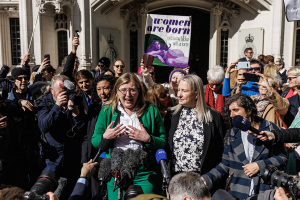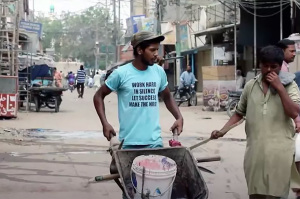Building a Foundation for Change – Part One
Some time back, I received the following letter.
Every day I wake up with good intentions to change my ways. I think today is going to be different. But it never is. Somehow and someway, I fall back into my same old ways of relating to people and my old bad habits. Sometimes I feel like there's a tug-of-war inside me. I really want to do what's best, but I always end up disappointing myself and God. I've tried everything – prayer, resolution, self-help tapes, and even hypnosis. Nothing seems to work. Why do I keep making the same bad mistakes? Why am I so resistant to change? Why do I do the things that I know are bad for me? I'm very discouraged. Pastor Rick, I need help.
Do you ever feel like that? Do you have anyone in your church who feels like that? The fact is, good intentions are never good enough. The kind of change that God wants to see in your life, in my life, and in the lives of people in our churches does not happen by simple willpower. The truth is we all have hurts, habits, and hang-ups that keep us from being everything that God has created us to be. These hurts, habits, and hang-ups ensnare pastors as well – and we won't change simply by trying harder.
The Bible says, "If the Son sets you free, you will indeed be free" (John 8:36 NIV). But if you look around in many of our churches, we have a lot of people sitting in chains. We're not living free. I've seen people who have been Christians for 20 years, and they still have the same habits, the same struggles, and the same carnality that everyone else does. They are simply not growing.
Jesus says, "I will set you free," but most of us don't really feel free, and we certainly don't live free. Instead, we feel more like Paul. In Romans chapter 7, Paul says, "I don't understand myself at all, for I really want to do what is right, but I don't do it. Instead, I do the very thing I hate. I know perfectly well that what I am doing is wrong, and my bad conscience shows that I agree that the law is good. But I can't help myself, because it is sin inside me that makes me do these evil things … No matter which way I turn, I can't make myself do right. I want to, but I can't. When I want to do good, I don't. And when I try not to do wrong, I do it anyway."
All of us know where Paul is coming from. In every human being there's a civil war going on inside – between what is good and what is bad, between God and Satan. The changes that God wants to see happen in your life, and in the lives of the people in your church and your community, are going to take more than prayer.
Just attending church isn't the answer either. I grew up in a pastor's home, and I've been around church people all my life. I realized pretty early that there were people who had been in church all their life and they were just as envious, just as angry, and just as cantankerous as everyone else. Church alone doesn't change you.
How to experience real life change
In fact, as you keep reading in Romans 7, Paul tells you what the answer to real life change is. And Paul's answer for life change is the same as ours and the same as the answer for the people sitting in our church each weekend. He says, "Thank God! The answer is in Jesus Christ our Lord" (Romans 7:25).
Jesus is the answer. You and I have to show people how Jesus brings about lasting change. Jesus uses a process to change our lives. Most of us don't understand that process, though. And we can't cooperate with that process if we don't understand it. This fall at Saddleback we're going to look at that process, found in Jesus' Sermon on the Mount, during a spiritual growth experience called Life's Healing Choices.Churches like yours can be a part of this time of transformation.
As we prepare for the September launch, we're going to look at the foundations of change that will lay the groundwork for the fall campaign. These foundations have been part of Saddleback for the past 30 years. We've seen more than 20,000 believers baptized at Saddleback over the past 30 years. But we haven't just brought them into the church. We've built them up, trained them for ministry, and sent them around the world on mission. We've sent over 8,000 Saddleback members to 69 countries. Life change has been at the center of what we've done.
These nine foundational truths about life change have been with us since the beginning. I'll share the first three in this issue and the last six in the next issue.
1. Understand that the goal of all change is Christlikeness. God doesn't want us to be happy; he wants us to be holy. We become holy as we become more like Jesus. When you look out at your congregation this weekend, remember this – God's goal for the people you see isn't balance, happiness, or comfort. He wants nothing less than for them to become like Jesus.
Paul tells us in Romans 8:29 (NIV), "For those God foreknew he also predestined to be conformed to the likeness of his Son, that he might be the firstborn among many brothers." We have a phrase here in America, "Like father, like son." God wants nothing more than for us to become like Jesus. God wants us to change to become like Jesus in how we act, how we talk, how we relate to others, how we relate to God, and every other aspect of our lives.
This fall the eight choices we'll talk about during the Life's Healing Choices study will all focus on making us more like Jesus. That's always the goal of biblical change.
2. Realize that both you and God have a part to play in changing. You can't do God's part in the change process, but you must do yours. You can see this clearly when Paul writes in Philippians 2: 12-13 (NIV),"Continue to work out your salvation with fear and trembling, for it is God who works in you to will and to act according to his good purpose." Notice Paul says, "Continue to work out ..." That's your part. And he says, "for it is God who works in you ..." That's God's part. We both have a part to play.
The Bible doesn'tsay to work for your salvation. It says to "work it out." There's only one way you can find salvation – by grace through faith. I work out with a trainer a few times a week. What I've learned is that you don't work out to create muscles you don't have; you work out to strengthen the muscles God has given you. When you "work out" your salvation, you don't earn it. Instead, you strengthen what God has already given you.
You can't change yourself, but – because of the cross – the Holy Spirit can. You do have a part to play, though.
3. Accept that lasting change starts with choice. Whatever hurt, habit, or hang-up you have, change begins with a choice. Choice is one of the greatest gifts that God gives us. In Scripture, God tells us to make healing choices. The Bible says in Deuteronomy 30:19 (NIV), "I have set before you life and death, blessings and curses. Now choose life, so that you and your children may live."
God says life is a choice. Jesus says, "I came so that you might have life and have it more abundantly." Life is a choice. But most people are just existing. They get up in the morning, go to work, come home, watch TV, and go to bed. Then they get up in the morning, go to work, come home, watch TV, and go to bed. And they just keep repeating that pattern. Then they go to a party on the weekend and think, "Yeah, I'm living." That's not living. It's existing.
The kind of life that God wants us to have is not automatic. Spiritual growth is not automatic. You have to make choices to help yourself grow. This fall in Life's Healing Choices we'll focus specifically on the kind of choices you and those in your church can make to grow spiritually and become more like Jesus.





























